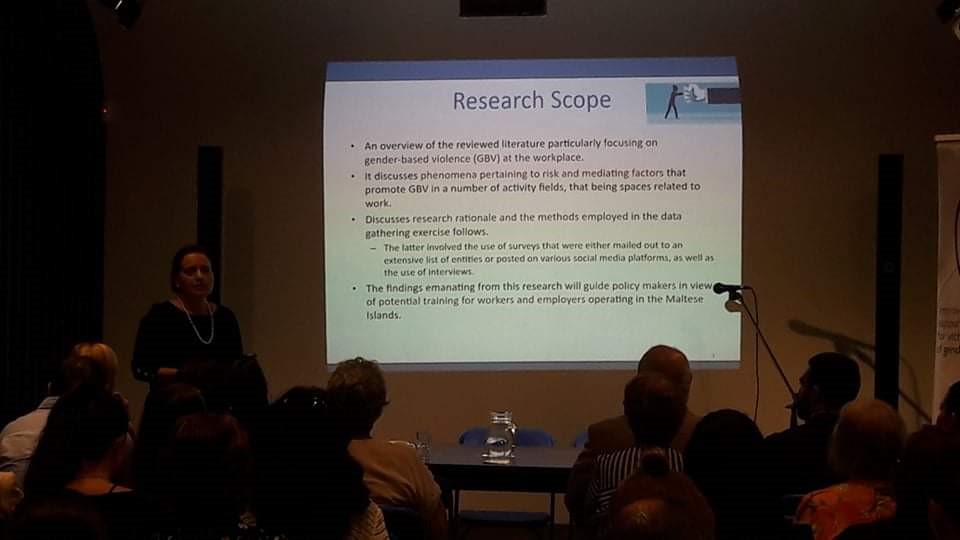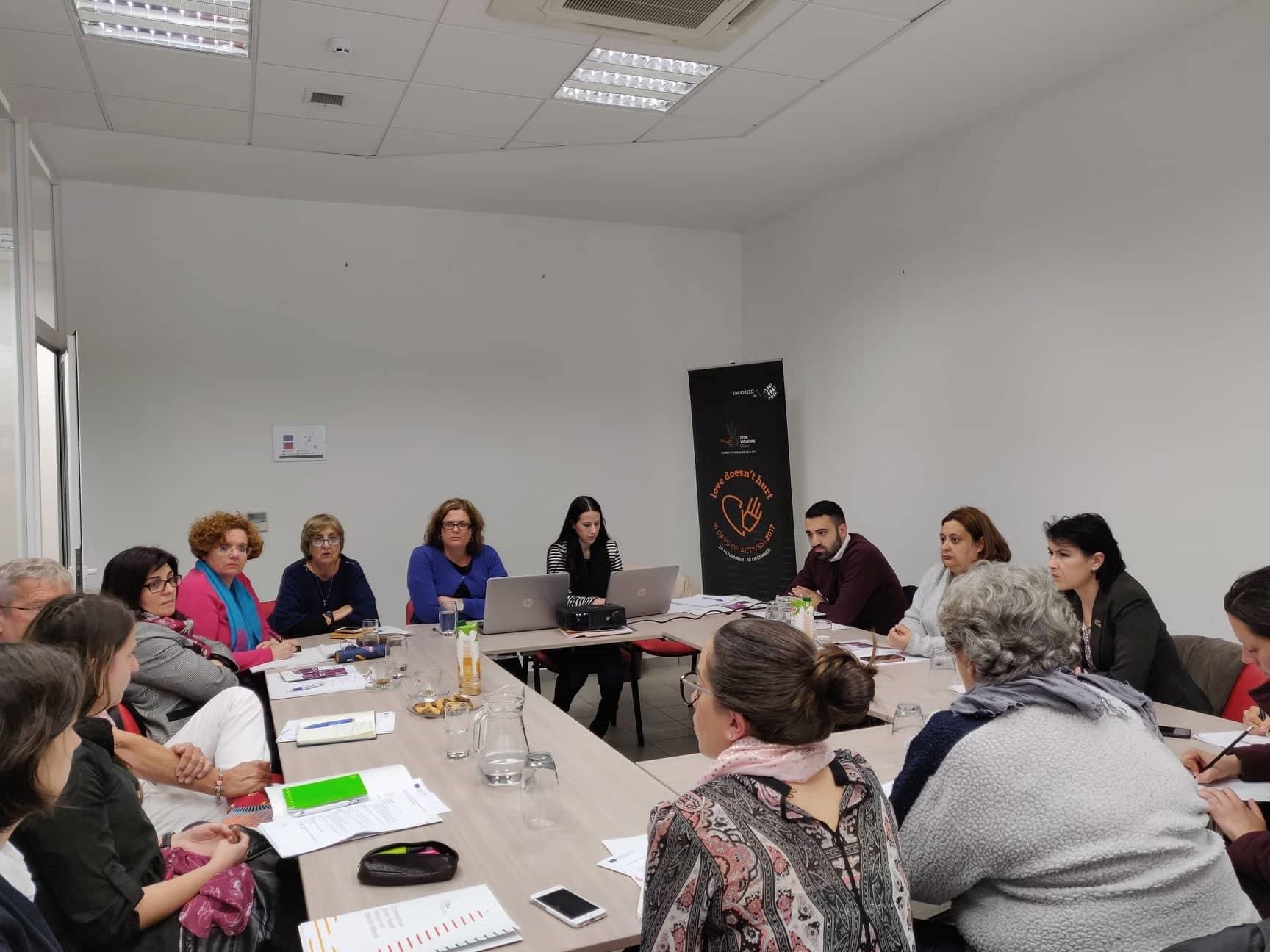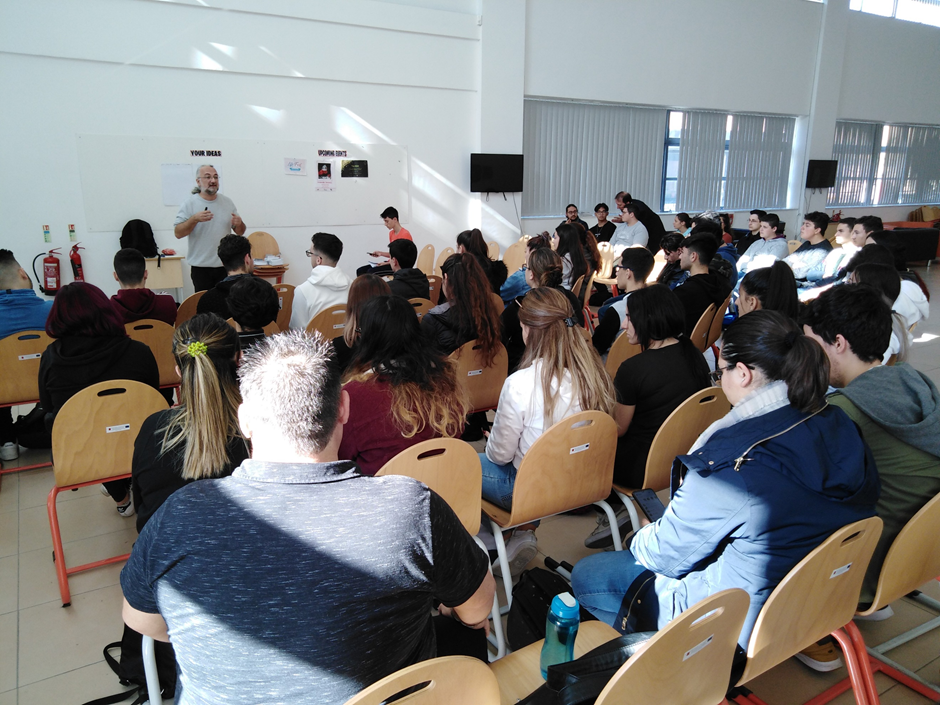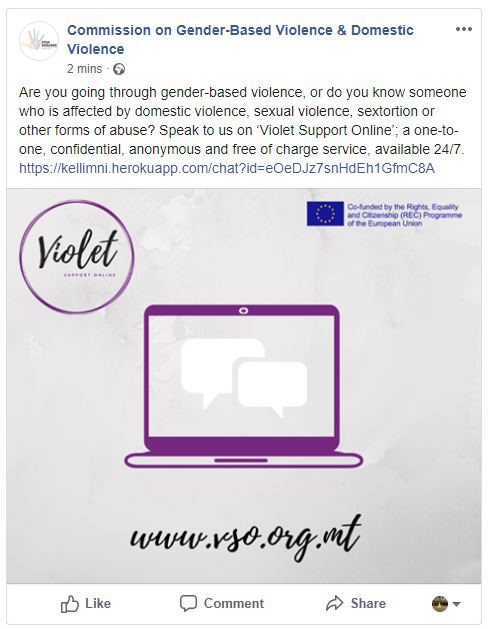Gender Based Violence
Projects
Improving Support Structures for Victims of Gender Based Violence
The project entitled Violet Support Online – Improving Support Structures for Victims of Gender Based Violence (GB-VSO) is in partnership with 5 partners from the public, private and civil society sector. The partners are Solidarity and Overseas Service Malta (SOS Malta), Victim Support Malta, CORE platform, Commission on Domestic Violence (CDV) and Advenio E-academy (AeA LTD). This project is being funded by the European Union (EU) DG Justice Rights, Equality and Citizenship Programme and will run from November 2018 until October 2020.
As a project, GB-VSO aims to improve support structures and provide protection to Victims of Gender-Based Violence. It follows the premise that providing comprehensive support structures, increasing the capacity to respond, together with awareness raising will contribute to ensuring that victims understand their situation, and feel empowered and supported to speak out. This project will specifically look at the workplace as a place where support structures could be strengthened.
CDV is mainly responsible for the below aspects within the Violet Project
Research Study

The research study, ‘Situation of Gender-Based Violence in Malta: Experiences and Effects at the Workplace’, discusses phenomena pertaining to risk and mediating factors that promote GBV in a number of activity fields. The findings emanating from this research will guide policy makers in view of potential training for workers and employers operating exercising their duties in the Maltese Islands.
The study holds a two-fold approach, which process incorporated quantitative and qualitative research tools. A survey was designed to explore phenomena related to GBV at the workplace. Also, the interview schedule pertaining to the survey were used to conduct face-to-face semi-structured interviews with a sample of 10 professionals. It is noted that this data gathering process was aimed to study GBV phenomena in the various places of work in the Maltese islands which findings will direct the design of training sessions for different employees and employers.
The quantitative survey was held between March and May 2019 with a total of 102 responses. Recipients were sourced from private enterprise, unions, public service and public sector, social media through the Faculty for Social Wellbeing site, the project partners’ sites and the use of the authors’ accounts.
The research study shows that respondents look at the support systems in three main ways: foresight, formalisation and follow-up. In terms of foresight, respondents feel the need to have more awareness to staff on what is GBV, readily available information and more effective communication with and between employees even on informal levels. In terms of formalisation, respondents express the need to have official guidelines, and in terms of follow-up, respondents focused on the need to keep the procedures updated to ensure that staff are continuously supported and that a self-help group could be setup across entities.
Findings of the research study also shows the need to carry out a larger scale study so as to address the magnitude of GBV. The need for training of staff was also noted and has to be provided in various ways that include awareness, the design of policy guidelines as well as awareness campaigns at the workplace. Participants in the survey and interviewees outlined the need for zero tolerance but more importantly to have effective accountability procedures in place, wherein when GBV is flagged third party professionals and specialised NGOs are roped in to mitigate in such cases. It was also evident that specialised training as part of professional development of staff is crucial and such has to be designed to meet the needs of the workplace as some settings promote GBV more than others as a number of risk and mediating factors to violence prevail. In view of this, one has to be aware that the workplace represents a melting pot of cultures and phenomena related to tolerance and violence are also culture specific.
Research Study was launched on 17th October 2019.
CDV also completed a recommendations report for training and a list of recommendations for policy makers.
Steering Group Committee

One of the objectives of the Violet Project is to enhance cross sectoral collaboration in developing responses to GBV in Malta, through the setup of a steering committee and through dissemination of research findings. In 2019, three [3] Steering Group Meetings were held. The objective is to create a steering committee to strengthen cooperation between different stakeholders in order to prevent and combat gender-based violence effectively. The Steering Group Committee is made of members from various sectors of society, including a member from the Malta’s Employers Association, participants from the University of Malta and representatives of the Private Sector. This collaboration allows us to raise awareness on the subject and to promote the online course to a group of people who are responsible for the wellbeing of their staff. Members of the SGC are encouraged to develop and implement effective workplace policies to tackle GBV and support victims of GBV.
Steering Group Meetings are held every three [3] months.
Outreach and Offline Marketing Campaign

One of the objectives of CDV is to conduct, on a regular basis and at all levels, awareness-raising campaigns or programmes, including those in co-operation with national human rights institutions and equality bodies, civil society and non-governmental organisations to increase awareness and understanding among the general public of the different manifestations of all forms of gender-based violence and domestic violence and the need to prevent and address such violence.
During the months of November and December, CDV organised a number of activities as part of the 16 days of Activism. These included a number of training sessions for professionals, including police officers, legal aid lawyers and family doctors. The main aim of these training sessions was to raise awareness on Gender-based Violence and Domestic Violence, however, each training session was adjusted accordingly to each profession. Seminars were also delivered to MCAST students.
Online Campaign

During the 16 Days of Activism, CDV made use of social media, mainly through its own Facebook Page as to raise awareness about gender-based violence, challenge discriminatory attitudes and call for improved laws and services to end violence against women for good. CDV, together with all other project partners, posted a number of images, video clips, articles and other material to make a difference in ending violence against women and girls everywhere.
Online Training Course
Another objective of this project is the development and implementation of an online course. The Award in Gender-Based Violence Support for HR Professionals is an online accredited programme by the National Commission for Further and Higher Education, with 2 ECTS credits at EQF/MQF Level 5 divided into two modules:
• The first module focuses on obtaining an understanding of the issues existent in gender-based violence, explored from the perspectives of those involved: the victims/survivors, the perpetrators and the children (in cases of domestic violence), including an overview of barriers that are faced, and the issue of intersectionality.
• The second module then focuses on how Human Resources’ personnel can provide support. It will present an analysis of the legislation and discussion about the services available, as well as the importance of company policies and practicalities in relation to Human Resources. The need for a change in mentality and work culture is also considered.
This award includes various guests from the field of gender-based violence and human resources who impart their specialized knowledge and talk about their practical experiences.
CDV has recruited participants to take part in the pilot testing of this course before rolling it out online. The testing included evaluation sessions at the end in order to make necessary arrangements. This led to an adaptation and finalisation of the course. Following this, CDV has contacted all Government HR departments in order to encourage them to participate in this course. Members of the Steering Group were also encouraged to disseminate this course to their members, colleagues and staff.
Intake 1 was carried out in 2019 and intake 2 will start at the beginning.
Organizational of Final Conference
CDV will be responsible for organising the final conference in September 2020. A Pan- European final conference will be held at the end of the project with partners and other related entities to illustrate the impact of the project and to share the best practice with international entities and stakeholders. Representatives from European stakeholders (such as Victim support networks, HR networks, government social services) will be invited which will be an opportunity to disseminate the results of the project, showcase the best practice and develop synergies for further replication of results. This conference will also involve presentations from other best practices in tackling GBV from across Europe to share learning and create networking and synergies.
